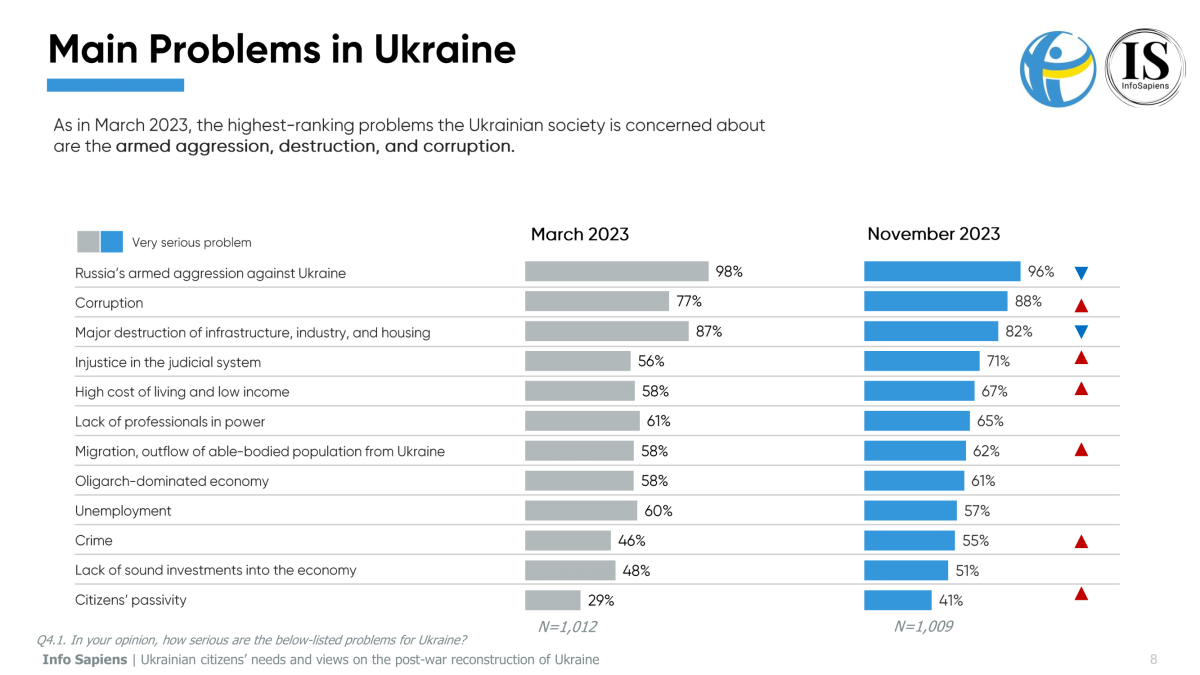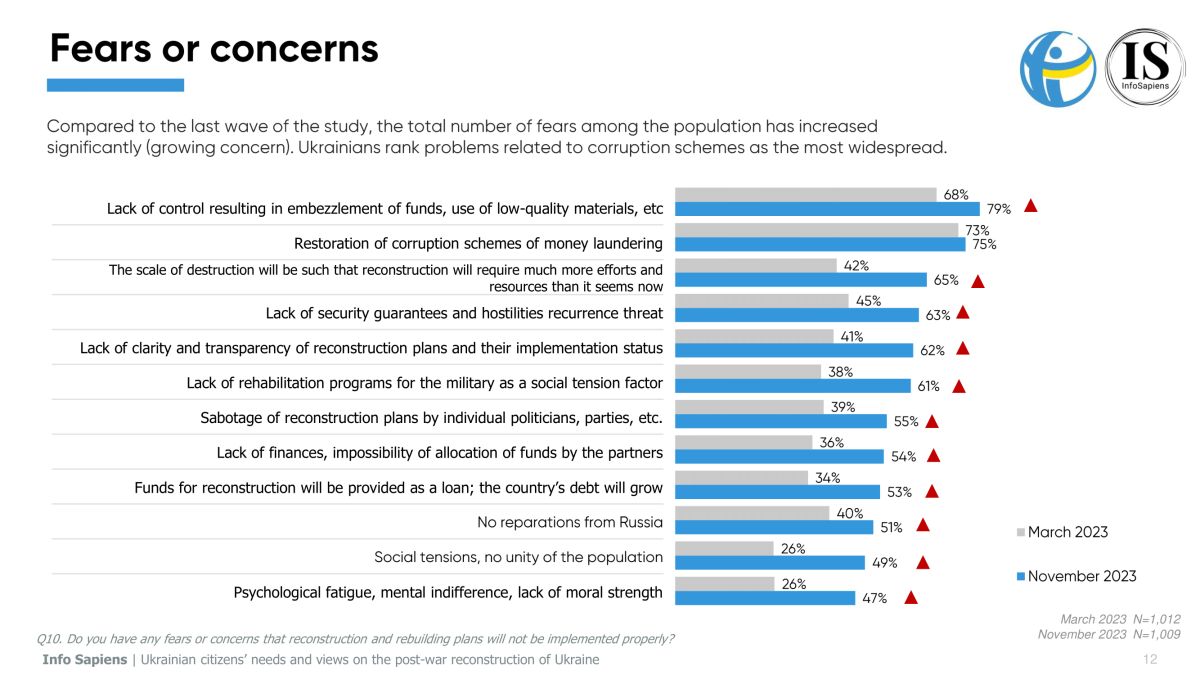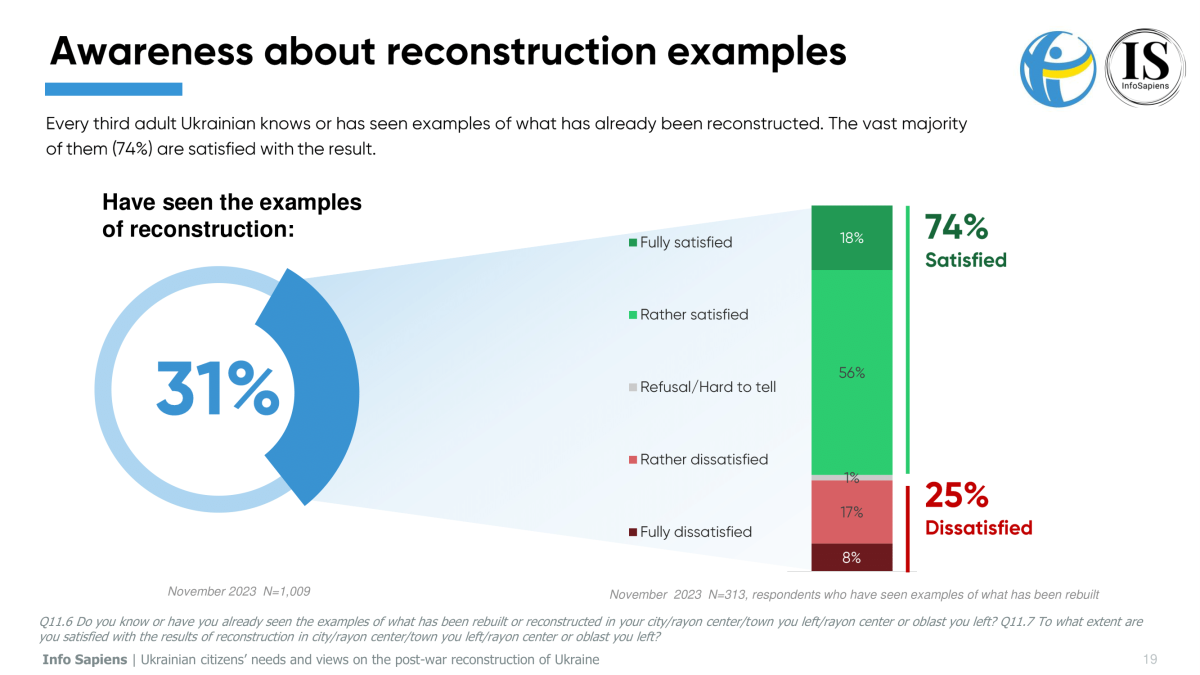

In the two years since the full-scale war, Ukrainians have changed significantly. We have become more pragmatic; we perceive problems, ways, and the need to solve them differently. The government, which has had to operate under martial law for almost two years, has also changed. But how synchronized are these changes? How can we improve the interaction among all of us?
To understand the current state of Ukrainian society, Transparency International Ukraine, with the support of the USAID project Support to Anti-Corruption Champion Institutions, conducted sociological research of the expectations and concerns Ukrainians have in general and regarding the processes of future reconstruction.
This is our second such survey. In the previous one, conducted in March 2023, we paid a lot of attention to the issue of the country’s recovery. This time, it also remains in our focus, but even more important are the general sentiments of society, its concerns, and its ability to act, visible as of the end of 2023.
As the research has shown, Ukrainian society is somewhat exhausted today; there are a higher number of problematic issues, and these concerns have intensified. There is an active feeling of fatigue, frustration, and confusion about the future.
Does this mean that we are in for an increase in internal tension and an inevitable negative scenario as far as societal development is concerned? Not at all.
The demands of citizens and the understanding of public sentiments are significant for the realization of what is needed to overcome the fears and improve the quality of public dialogue and interaction. In our material, we try to consider how to achieve this.
As the research has shown, Ukrainian society is somewhat exhausted today; there are a higher number of problematic issues, and these concerns have intensified.
Problems are perceived more acutely, and the demand for their solutions has grown
As in March, Ukrainians today consider war (96%), corruption (88%), and destruction of infrastructure and housing (82%) to be the three main problems. Although the order of these issues has remained unchanged, their perception has become more tangible. Fears of war and destruction in November have slightly decreased compared to March (by 2%), while corruption risks worry Ukrainians more, by 11%. In general, these data show that almost every issue mentioned in the questionnaire worries the average Ukrainian 5–10% more than in March.
There are several reasons for this.
- Violation of the social contract on the integrity of approaches and the joint fight against external and internal enemies. After the full-scale invasion began, an unspoken social contract was formed, according to which all efforts — physical, financial, and mental — were channeled to fight Russian invaders, a common enemy; internal strife was forgotten for a while, and, given the external aggression, the solution of internal problems took a back seat. There was a feeling that all the “schemes,” corruption abuses, politicking, and squabbles remained in the times before February 24, 2022. However, numerous facts of violation of this contract (bribery, embezzlement of humanitarian and procurement funds, political overtures) breached this tacit agreement and caused indignation, anger, and a demand for public control.
- Overestimated expectations for 2023. Back in March, we were prepared for the successful (counter)offensive, coffee in Crimea by the end of the summer, etc. However, in the past six months, the achievements have not met the overestimated expectations of Ukrainians. A sense of optimism, unity, pride in having survived in 2022 and gained significant victories on the battlefield, is gradually moving towards disappointment due to the failures in 2023.
- Adaptation to life in conditions of war. More than 70% of respondents now believe that the processes of economic recovery and reconstruction of the country will last up to 10 years or more. However, as scary as it is to admit it, Ukrainians are gradually getting used to living with constant shelling and the sounds of air raid alarms. Therefore, the problems of economic life and welfare are becoming a priority: unfair justice system (71%), high cost of living and lower incomes (67%), lack of professionals in power (65%), migration and outflow of the able-bodied population (62%). Ukrainians feel the consequences of these problems in their daily lives and predict their even more serious impact in the future.
People have a high need for attainable achievements — both over internal and external enemies. One of the attainable ways to obtain them is the fight against corruption, which embodies everything related to Soviet times: the lack of integrity, the reluctance to change, everything we are actually fighting against.
Fears of war and destruction in November have slightly decreased compared to March (by 2%), while corruption risks worry Ukrainians more, by 11%.
Corruption has become an attainable enemy
Looking at the data on the assessment of the corruption level and reading our media, it appears that there are no positive practices in the fight against corruption at all, that public funds, including international assistance, are spent inefficiently, and that all public officials lack integrity.
The worst thing is that such statements are widely spread not only at the national level but also by international media, which Russian propaganda is actively using. Everyone is trying to convince Ukrainians that their country is totally corrupt, and, in addition to the lengthy war, this can cause a sense of hopelessness for many.
Why is this happening?
On the one hand, there are objective reasons for that: scandals, embezzlement, cases of bribes, and more and more facts about corruption at different levels. There are blatant cases of embezzlement even in the supply of humanitarian aid and defense procurement; many attempts to obtain extra-large bribes by senior officials this year quite rightly caused indignation within society. What kind of justice can we talk about when Vsevolod Kniazev, the head of the Supreme Court of Ukraine, an official on a par with the president or prime minister, received a bribe of USD 2.7 mln right in his office?
On the other hand, we also have positive results in the fight against corruption, which are recognized at the international level. In the last year alone, the number of suspicion notices of corruption has increased significantly, which indicates the active work of the NABU and the SAPO; more and more cases are the result of whistleblowers’ reports. The HACC, for its part, delivers verdicts in corruption cases, and the NACP finally has all the functions spelled out for it in the law restored, although the Agency still has other flaws in its work. In general, the capacity of anti-corruption bodies has increased significantly in recent years, according to our special study. These and other achievements are reflected, in particular, in the report of the European Commission, which, as a result, recommended opening negotiations on Ukraine’s accession to the EU.
In their personal experience, Ukrainians now face corruption much less often, according to the data.
Unfortunately, all these positive messages are frequently lost in the whirlpool of negative news or are generally perceived as ordinary PR practices of public authorities. Therefore, despite the achievements, the demand for an effective fight against corruption is growing.
For example, if we talk about future reconstruction, then the fear of potential corruption comes first. 79% of Ukrainians are concerned about a lack of control, which may result in embezzlement or the use of poor-quality materials. 75% of respondents are concerned about the resumption of corruption schemes to launder money on large-scale projects.
That is, according to Ukrainians, corruption is evil, but given other concerns, they perceive it as the cumulative embodiment of all evil, injustice, and the issues our country faces. Thus, in the light of fatigue, irritation, and a lack of understanding of the future, bribes and the intricate schemes of public officials become even more destructive. So, our common chance now is to use the fight against corruption as a springboard, for example, in the already-mentioned reconstruction.
According to Ukrainians, corruption is evil, but given other concerns, they perceive it as the cumulative embodiment of all evil, injustice, and the issues our country faces.
Reconstruction is a litmus test of the country’s capacity
Our research has shown that Ukrainians have their own expectations of how the country should be rebuilt after the war. They understand that the features of communities should be considered; there is a demand for decentralization in the distribution of funds, for transparency at all stages and engagement of citizens.
As for the changes in the expectations Ukrainians have of the future reconstruction processes, they have changed their opinion about how long the reconstruction can take. If in March 60% of respondents believed that reconstruction could take up to 10 years or more; in November, this number increased to 73%. This indicator was primarily influenced by the pace and course of the war, but such a change in sentiment also indicates a readiness for a more balanced dialogue and approach to the very understanding of reconstruction. This shows the growth of realism and pragmatism in the public mood.
Moreover, the majority of respondents believe that people who have lost their homes need to have their houses built now (56%), the reconstruction should be based on the principle of decentralization (72%), and it is necessary to develop a reconstruction strategy now so as not to waste time (78%).
However, the skepticism and increased concerns that we observed in our research are also manifested in the attitude towards reconstruction. The share of those who are convinced that reconstruction plans should consider the course of hostilities has increased significantly (from 11% to 20%).
The overall impression of the examples of recovery is often positive. The current state of reconstruction meets or exceeds the expectations of 46% of Ukrainians, while 32% of respondents assess these processes negatively. Interestingly, the most positive perception of reconstruction is observed in the Northern (50%) and Eastern (52%) regions of Ukraine, where people suffered significantly due to the full-scale invasion.
Time also encourages Ukrainians to become more engaged in reconstruction and learn about how it can take place. Our research has shown that every third adult Ukrainian knows or has seen examples of what has already been rebuilt. The vast majority of them (74%) are satisfied with the result.
As in March-April 2023, it is crucial for the population that such processes be devoid of corruption, and for this, people need information to be as accessible as possible. Ukrainians consider it essential to control the stages of implementation and quality of works (75%), costs and information about contractors (73%), and want to know about the responsible persons, although the importance of this indicator has decreased significantly: from 78% to 71%.
Here we again mention the main demand of Ukrainians in terms of reconstruction, namely, the urgent development of a comprehensive plan and strategy for such processes. In this matter, Ukrainians primarily expect the quality of the results. Thus, 50% of the respondents are convinced that all contractors should be selected on a competitive basis, while 30% of them consider it necessary to provide certain advantages to Ukrainian businesses. Requirements to contractors have also grown, in particular in terms of compliance with international quality control standards (63%), reputation (63%), and relevant experience (55%). Of course, Ukrainians want to have access to information about the level of compliance with such requirements.
In general, our research has shown that Ukrainians realize that during martial law, they can rely on the authorities mainly in terms of isolated repairs or to make housing in critical condition habitable. However, they do not really hope for the restoration of the former level of comfort. They consider the full development of new residential areas to be more realistic after the war.
Although citizens mostly positively assess the recovery program, they lack an understanding of how it is taking place. And it is the lack of such understanding that generates distrust.
Thus, the future reconstruction has become a field where the state can maximize its capacity, openness, and high professional standards in the fight against corruption in the coming years. But for this to happen, it needs to show its readiness for dialogue, establish effective communication, and provide Ukrainians with a real opportunity to participate in these processes. Moreover, despite the war and sometimes disappointment, our citizens still have enough strength for such work.
The future reconstruction has become a field where the state can maximize its capacity, openness, and high professional standards in the fight against corruption in the coming years.
We have the resources to fight
Although the above data may give the impression that many of our fellow citizens are apathetic and disbelieving, this is not the case at all. The results of the second wave of the research have shown that at the end of 2023, society continues to demonstrate its maturity and willingness to give up its own interests for the sake of others.
For example, 17% of citizens indicated that their property was damaged as a result of hostilities. Only 32% of them applied for compensation and reimbursement.
Among those who did not apply, 37% said that the state had more urgent priorities for funding; 12% of respondents believe that there are people who have suffered much more. Isn’t this the very unexpected act of support that indicates we are a healthy society?
The general feeling of support among Ukrainians is very high: 43% of respondents indicated that they received some kind of assistance after the invasion, the majority being in the East — 88%.
As for the engagement in the reconstruction of the country, 36% of respondents consider it their duty to participate in the discussion of reconstruction projects, and another 39% indicated that they would join such public discussions if possible.
Ukrainians are well aware of the importance of assistance from international partners to keep our country going. Thus, 43% of Ukrainians note the significant contribution of international donors to the reconstruction process, and the most positive assessments account for young people, who are generally more aware of the opportunities for cooperation with the West and are most often engaged in volunteer projects.
The results of the second wave of the research have shown that at the end of 2023, society continues to demonstrate its maturity and willingness to give up its own interests for the sake of others.
***
As we can see, society closes the second year of the full-scale invasion in a rather complex emotional state. We are witnessing an unstable foreign policy situation; a war of attrition is going on at the front, and the general stress, fatigue, and demand for justice are only increasing.
So, not being able to quickly expel Russian aggressors from our land, we strive to fight demons inside the country, and these demons today are corrupt officials. They are the embodiment of the injustice and evil that hurts the whole country. Since Ukraine has already done a lot in this area, the achievements in this field are quite attainable in the future.
However, it is important to remember that society has changed. The rhetoric of communication also needs to change: pragmatism, realism, efficiency, and dialogue are the key communication tasks of the authorities at all levels in interaction with the citizens of their country. All this should take place under the conditions of a real fight against corruption.
For the current tension not to result in negativity, the Ukrainian authorities should respond to the demand for specific communication, clear long-term plans, and real engagement of citizens in all processes and, above all, in reconstruction, which can become a real window of opportunity for all.
In almost two years, Ukrainians have already gotten the feeling that both the war and the reconstruction will be lengthy. But they are ready to fight on.
Whatever our social and personal sentiments, each of us and the whole country together will need to overcome them. The best way to do that is to turn our instability point into a foothold.
For the current tension not to result in negativity, the Ukrainian authorities should respond to the demand for specific communication, clear long-term plans, and real engagement of citizens in all processes and, above all, in reconstruction, which can become a real window of opportunity for all.
This publication was made possible by the support of the American people through the United States Agency for International Development (USAID) within the SACCI project. The content of this publication is the sole responsibility of Transparency International Ukraine and does not necessarily reflect the views of USAID or the United States Government.












